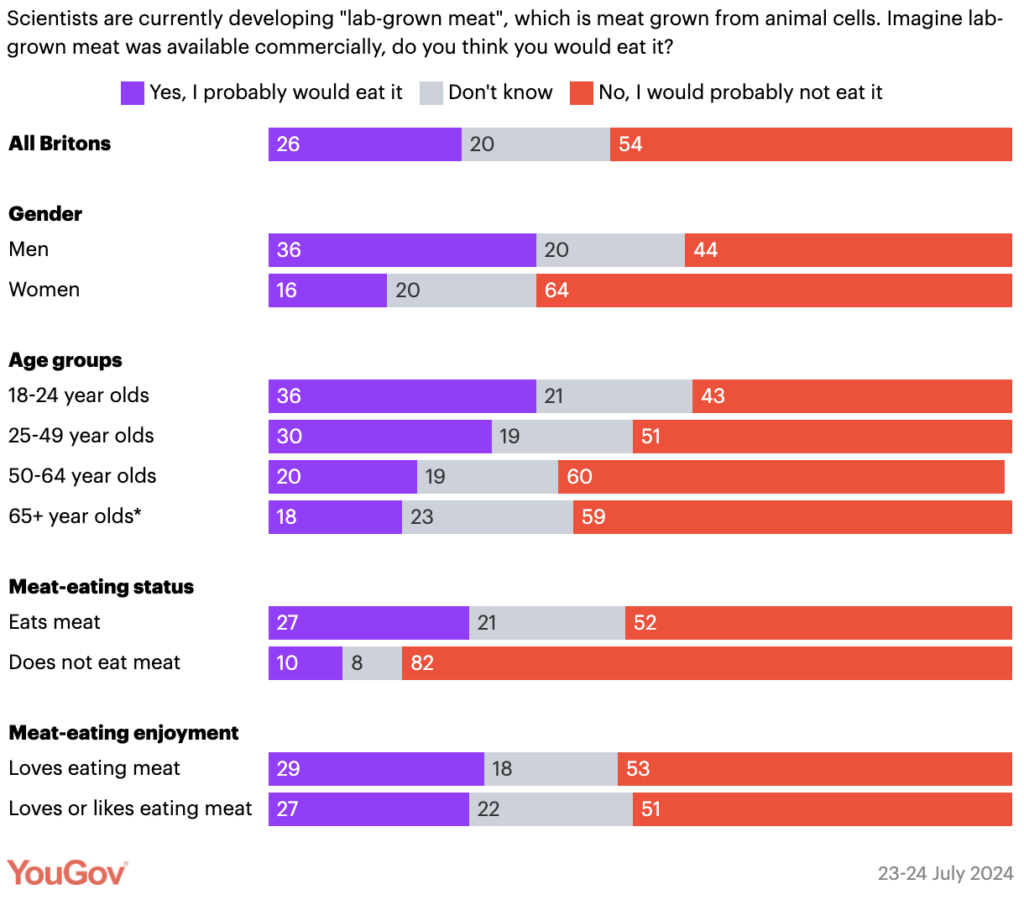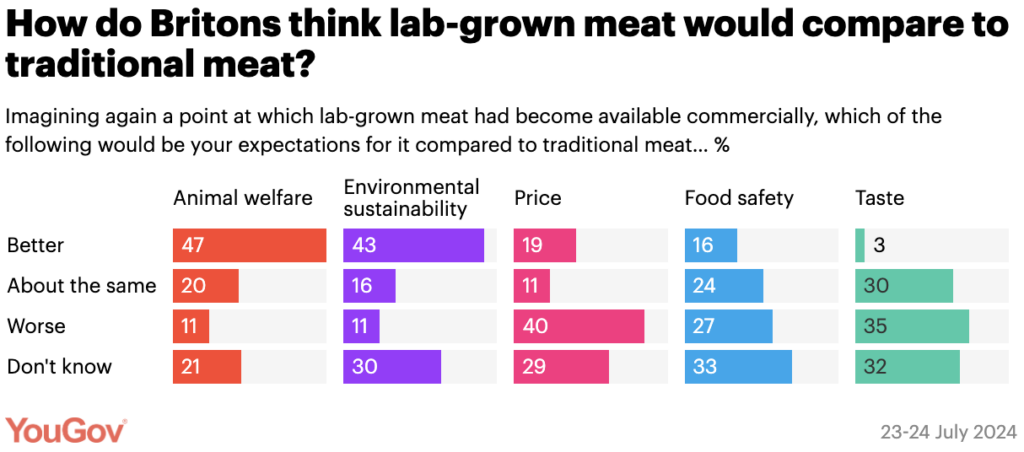Brits More Open to Cultivated Meat Than A Decade Ago, But Taste & Price Are Putting Consumers Off
4 Mins Read
A quarter of UK consumers say they’d try cultivated meat, recognising its animal welfare and environmental value – but taste and price remain major obstacles.
In 2012, 19% of consumers in the UK said they would be willing to eat cultivated meat, according to a YouGov poll. Now, 12 years on, that number has risen to 26%, with Brits more aware of the climate and welfare impacts of these novel proteins.
On the heels of the UK’s first approval of cultivated meat for Meatly’s pet food, a 2,032-person survey by YouGov has revealed that as the industry has advanced, so has consumer perception of it – although improvements in taste, price and food safety awareness are key to wider adoption.
Nearly three-quarters (74%) of British citizens have now heard of cultivated meat, evidence of the fact that it is now allowed to be sold commercially in Singapore, the US, and Israel, alongside the UK.
However, more people would avoid cultivated meat (54%) than try it, a sentiment particularly higher among women, older citizens and people who don’t eat meat.
UK consumers more open to cultivated meat for pets than humans

The YouGov survey revealed that men and people aged 18-24 (36% each) are much more likely than women (16%) and Brits ages 50 and above (around 60%) to try cultivated meat. This trend is in line with the association of meat-eating with masculinity, and Gen Z with greater climate consciousness.
Cultivated meat was most unpopular with non-meat-eaters, 82% of whom say they wouldn’t consume it. And mirroring partisan trends in the US, supporters of right-wing parties like the Conservatives and Reform UK are less interested in cultivated meat (20% and 17%, respectively) than centrists and leftists such as the Labour Party and Liberal Democrats (30% each).
When asked if cultivated meat should be allowed for sale, YouGov found interesting results. Brits are much more in favour of the government greenlighting cultivated meat for pets than humans, a notable finding given that the only startup that has received clearance (the aforementioned Meatly) makes cultivated chicken for dogs and cats.
Nearly half (48%) of consumers support cultivated meat being sold for pets, versus just 30% who are against it. But when it comes to buying it for themselves, only a third (34%) are in favour, while 44% are opposed to it. Currently, the UK’s Food Standards Agency is assessing applications for cultivated beef from Aleph Farms, chicken from Vital Meat, and foie gras (from duck) from Gourmey.
Brits wary of taste, price and safety of cultivated meat

In a positive sign for the alternative protein industry, British citizens do recognise the environmental and welfare credentials of cultivated meat. Almost half (47%) of respondents believe these proteins are better for animal welfare than conventional meat, and 43% find them environmentally superior. Only 11% feel it would be worse across both aspects.
However, things are less encouraging when it comes to other factors. Only 3% of Brits think cultivated meat will taste better than conventional meat, for example. But 30% say both would taste the same, while 35% say the former would taste worse. Highlighting the need for further education, nearly a third (32%) of consumers don’t know how cultivated meat would taste.
Similarly, only 16% suggest cultivated meat would be safer than conventional meat, versus 24% who say it would have the same health effects, and 27% who feel it’ll be worse. Here, too, uncertainty looms large, with 33% saying they don’t know whether it’s safer or not.
Brits are slightly more sure that cultivated meat would be more expensive, with 40% saying so. But again, 29% are unsure, and one in five (19%) actually think it could be cheaper.
“Despite the implication that lab-grown meat would not require the slaughter of animals, nor be subject to the same food safety risks of eating e.g. wild animals, the public are significantly less likely to think it would be acceptable to create lab-grown meat from animals not traditionally eaten as food,” writes Matthew Smith, head of data journalism at YouGov.
An identical share of Brits (54%) say it is acceptable for manufacturers to make cultivated versions of chicken, beef, salmon and pork. Similar numbers exist for sheep (53%) and duck (51%), an interesting finding given Gourmey only announced its regulatory application for the latter in the UK (and four other markets) last week.



